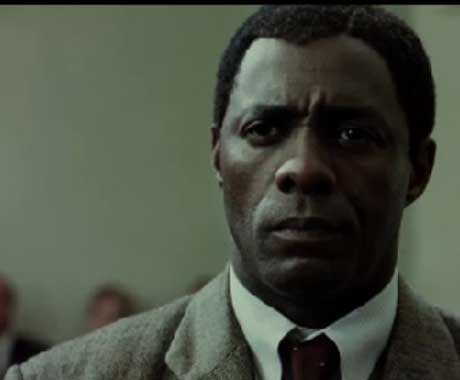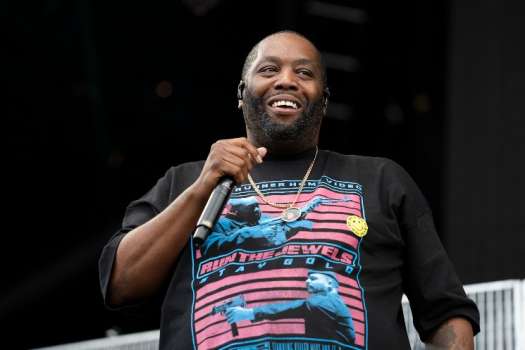There's a quietly powerful moment in Justin Chadwick's engrossing biopic Mandela: Long Walk To Freedom that speaks to the struggle of fighting for a cause while locked behind bars. After Nelson Mandela has been sentenced to life in prison and the door has been slammed shut to his cell, he screams out a familiar rallying call that's typically met with an impassioned response from the crowds. It's now greeted with a deafening silence that will become his reality for the better part of three decades.
Condensing a life as rich as Mandela's into a movie a little over two hours is an unenviable task and the screenplay by William Nicholson does a fairly admirable job of balancing the important developments of his life, even as it sometimes feels like it only just skims the surface. It helps that Idris Elba delivers a powerhouse performance in the title role, one that gets beneath the saintly veneer of the great leader to find a complicated and wonderfully charismatic man who inspired revolution while also having his share of difficulty in relating to the women in his life.
As a lawyer in South Africa early on in the film, Mandela wins cases because the white people that he questions on the stand refuse to even endure the ordeal of being spoken to in such a manner by a black man. Recruited because of his way with words by the African National Congress, he is soon at the forefront of the movement to end apartheid. After bringing about the demise of his first marriage with his adulterous ways, Nelson falls in love with a beautiful social worker named Winnie (Naomie Harris) who supports him in his efforts and will later endure persecution because of it.
It's only when Mandela fights violence with violence that he is eventually caught and arrested along with several others in the group. As he serves the time in prison for his crimes, he spends the years dealing with corrupt guards and poor accommodations while waiting on rare visits from family members or any news at all from home. As the world changes while he is confined though, there is growing support to release him and a political need for it to be done in as delicate a manner as possible.
If the latter part of the film after he is released feels as if it drags a little, then it's probably because the greatest personal trials of Mandela's life were already behind him and this presents a unique challenge in constructing any conventional narrative structure around the leader. As it stands, this is a perfectly serviceable account of Mandela's life that should attract even more interest in light of Mandela's recent passing, but it still can't possibly do justice to everything he was to everyone.
Of course, what movie could really?
(eOne)Condensing a life as rich as Mandela's into a movie a little over two hours is an unenviable task and the screenplay by William Nicholson does a fairly admirable job of balancing the important developments of his life, even as it sometimes feels like it only just skims the surface. It helps that Idris Elba delivers a powerhouse performance in the title role, one that gets beneath the saintly veneer of the great leader to find a complicated and wonderfully charismatic man who inspired revolution while also having his share of difficulty in relating to the women in his life.
As a lawyer in South Africa early on in the film, Mandela wins cases because the white people that he questions on the stand refuse to even endure the ordeal of being spoken to in such a manner by a black man. Recruited because of his way with words by the African National Congress, he is soon at the forefront of the movement to end apartheid. After bringing about the demise of his first marriage with his adulterous ways, Nelson falls in love with a beautiful social worker named Winnie (Naomie Harris) who supports him in his efforts and will later endure persecution because of it.
It's only when Mandela fights violence with violence that he is eventually caught and arrested along with several others in the group. As he serves the time in prison for his crimes, he spends the years dealing with corrupt guards and poor accommodations while waiting on rare visits from family members or any news at all from home. As the world changes while he is confined though, there is growing support to release him and a political need for it to be done in as delicate a manner as possible.
If the latter part of the film after he is released feels as if it drags a little, then it's probably because the greatest personal trials of Mandela's life were already behind him and this presents a unique challenge in constructing any conventional narrative structure around the leader. As it stands, this is a perfectly serviceable account of Mandela's life that should attract even more interest in light of Mandela's recent passing, but it still can't possibly do justice to everything he was to everyone.
Of course, what movie could really?




